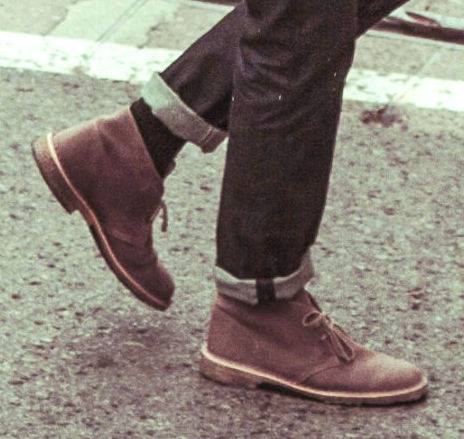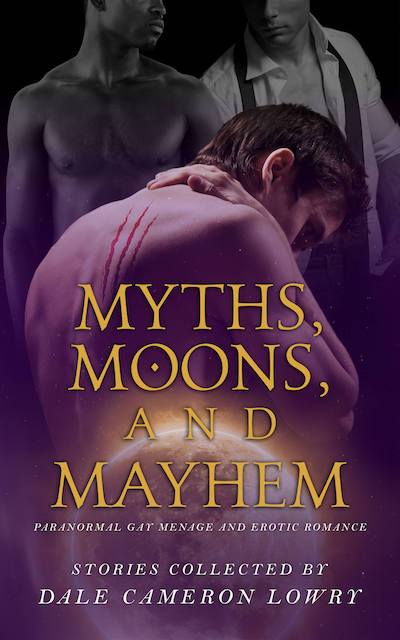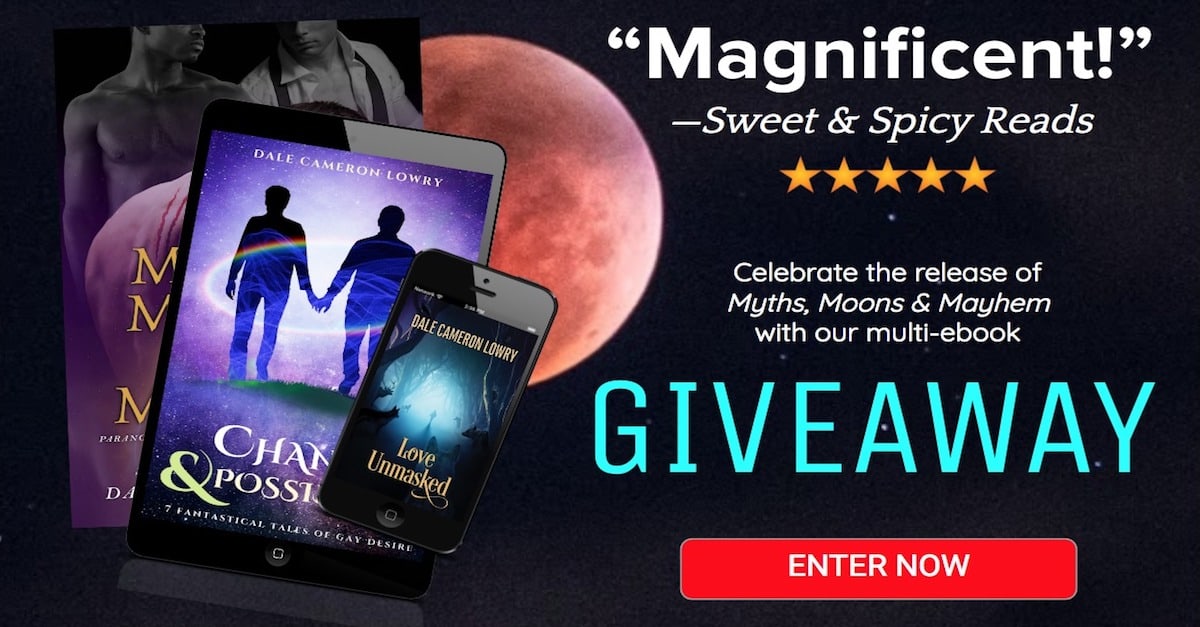Welcome to my weekly Author Spotlight. I’ve asked a bunch of my author friends to answer a set of interview questions, and to share their latest work.
Today, Dale Cameron Lowry – Dale Cameron Lowry’s number one goal in life is getting the cat to stop eating dish towels; number two is to write things that bring people joy.
Thanks so much, Dale, for joining me!
J. Scott Coatsworth: Tell me one thing hardly anyone knows about you.
Dale Cameron Lowry: I do not like the Disney movie The Little Mermaid because of the sexist plot, but I love the 1989 German soundtrack. Disney later redid the translation to be more faithful to Howard Ashman’s English lyrics, which are ingenious; but faithful translations aren’t always good ones, and I’ve never developed a liking for the new version.
JSC: When did you know you wanted to write, and when did you discover that you were good at it?
DCL: I started writing for fun when I was in second grade, I think? This precocious British girl in my international school told me she’d already written a novel. It occurred to me that books come into existence because people wrote them, and I was a person, so I could write one. I made a picture book about a young star (a “luminous sphere of plasma held together by its own gravity,” not someone famous) and its adventures in the universe. I’m pretty sure it was astronomically inaccurate even for 1980s standards. But I will never apologize for having called Pluto a planet.
I’m not sure I ever discovered I was good at writing. I just kept writing and writing until I got less bad it. I listened to my teachers and, eventually, other writers. Some of them had horrible feedback (“Why do you insist on writing such absurd things?”), but a lot of them had decent advice (“Show, don’t tell” and “When you run across a book that you really enjoy, pay attention to how the writer puts words together and the effect that has on your reading experience. Learn from those writers. Copy them until you get bored of copying them.”)
JSC: Were you a voracious reader as a child?
DCL: No. I read often, but I read slowly and still do. I think of voracious readers as people who read lots of books, and I’ve never been good at that. My sister reads a ton. It makes me jealous.
JSC: How would you describe your writing style/genre?
DCL: My background is in literary fiction with lots of ennui and heartbreak, but I prefer genre fiction these days because it allows more freedom with subject matter and tone. Right now, I mostly write romance and its subgenres because I like stories to have happy endings. The world needs those, and queer people especially.
Everything I write, whether it’s romance or erotica or sci-fi, tends to be character-focused. My fiction is less about orgasms and explosions than it is about how those orgasms or explosions affect a character’s journey. I write this way because that’s what I like to read. I don’t care how exciting your plot or world building is if your characters’ struggles and desires aren’t compelling.
I guess that’s why one of my reviewers described my erotica as “literary spank bank.” I’m not sure if she meant that as an insult or compliment, but it’s accurate regardless. Creating a nice one-handed read isn’t enough for me; sure, it’s okay if it’s one-handed, but I also wanted to engage both sides of your brain. I want to tell a story that you’ll think about after you close the book or turn off your e-reader.
JSC: What action would your name be if it were a verb?
DCL: Chew.
JSC: What was your first published work? Tell me a little about it.
DCL: Um … I don’t remember? Probably something in the high school literary magazine or an essay in the local vegetarian newsletter when I was a teenager. Or maybe it was a letter to the editor I wrote to The Vegetarian Times? Those were all around the same period.
Do I sound like an asshole for not being sure? Ah well. Here’s some context: I later worked for school papers and became a reporter for a daily newspaper. As a reporter, you publish so many pieces, you can’t keep track of all of them. It’s actually a great exercise in learning to disinvest your ego from the writing process. Editors rearrange your paragraphs; copyeditors change your punctuation and spelling and sometimes delete entire sections of a story. During my time as a journalist, I became a lot less attached to my every word and what ended up published or not published.
JSC: What’s the weirdest thing you’ve ever done in the name of research?
DCL: Weird is in the eye of the beholder. Some people would think it was weird to travel across two states to tour a newly built Mormon temple, but I call it fun.
JSC: What’s your writing process?
DCL: Sit (or stand) in front of the computer and write. I usually edit and rewrite as I go—it helps me move forward. I might listen to classical music in the background, but never anything with words, even in a language I don’t speak. It’s too distracting.
Sometimes I write freehand. This can be really useful for when I want to brainstorm a story and not edit as I go. The downside of this method is that my hand cramps up really easily and I have terrible handwriting. If I don’t dictate whatever I’ve written into my computer within the next few days, my words may be forever lost simply because I won’t be able to figure out what I wrote.
JSC: Would you visit the future or the past, and why?
DCL: Nope. I’ve read too many books where that f***s everything up. Though I suppose if I could do it without having an effect— Oh, c’mon. It would.
And even if I could travel to another time without the observer effect coming into play? How horrible would that be, to visit another time and see suffering (because someone will be suffering to some degree, somewhere), and not be able to do anything about it?
I often feel helpless enough in the present day. Why add to that with time travel?
Still, it makes good fodder for stories.
JSC: What are you working on now, and when can we expect it?
DCL: Right now, I—along with the rest of the anthology’s authors—am blogging like mad about Myths, Moons, and Mayhem. You can read all about it on my blog for readers or by checking out my Myths, Moons, and Mayhem tag.
I’m also working on a contemporary gay romance set in Madagascar, the same setting as my story in Myths, Moons, and Mayhem. I don’t know the release date. And I’m always working on gay Mormon things. I have the draft of a novella and two book outlines on gay Mormon themes on my computer.
When I see a submission call I like, I’ll often take a break from whatever my big project is to write a short story. I post a lot of these calls for submission on my writing blog, so other writers should check them out if they want inspiration for themselves.
And now for Dale’s latest book: Myths, Moons and Mayhem:
QSFer Dale Cameron Lowry has put together a new MMM paranormal anthology book out:
Myths, moons, and mayhem make the perfect threesome—and so do the men in this anthology.
Enjoy nine erotic stories of paranormal ménages a trois fueled by lust and magic, where mystical forces collide with the everyday world and even monsters have their own demons to conquer.
A werewolf gets a lust-fueled lesson on fitting in with the pack, a professor unlocks ancient secrets and two men’s hearts, and a pair of supernaturals find themselves at the erotic mercy of a remarkable human. Ghosts, fairies, aliens, and mere mortals test the boundaries of their desires, creating magic of their own.
Penned by favorite authors such as Rob Rosen and Clare London, as well as by newcomers to the genre, Myths, Moons & Mayhem is an eclectic mix of paranormal lust and polymythic beings that will spark your fantasies and fuel your bonfires.
Buy Links
Giveaway
To celebrate the release of the paranormal gay ménage anthology Myths, Moons & Mayhem, Dale Cameron Lowry and Sexy Little Pages are giving away trick-or-treat baskets filled with delectable paranormal, scif-fi, and ménage ebooks (epub or mobi) for your reading pleasure.
Excerpt
From “The Cave” by Dale Cameron Lowry in Myths, Moons, and Mayhem
About “The Cave”: America nature photographer Ethan and his co-worker Heather are accompanying a group of paleontologists on a caving expedition in Madagascar when Heather and Mendrika, one of the scientists, fall victim to a possible curse. The story is told from Ethan’s point of view.
By the way, Mendrika is common a man’s name in Malagasy, the national language of Madagascar. It means “dignified” or “deserving.” His husband, Joseph, is French. They both become Ethan’s love interests, but you’ll have to read the entire story to get to that.
Heather and I have been out almost two weeks this time around. It’s our dozenth assignment together for the magazine—she does the writing, I focus on pictures—and our third in Madagascar, 250 miles off the eastern coast of Africa. But this is our first visit to these limestone karst caves. They’re home to the remains of animals that once roamed the island: elephant birds twice the size of ostriches, gorilla-sized lemurs, and tiny hippopotami.
Like with most of our assignments, this place is remote from most other humans and conditions are bare bones. No electricity without batteries, no running water unless you count the nearby stream, and Internet that’s accessible only by satellite.
But that’s not what made today long. Heather and I split up earlier this afternoon, so she could go with Mendrika and one of the grad students to take sediment samples from a nearby lake. They decided to take a shortcut by going over the edge of the cave, in a spot where they thought the roof was solid.
That was their mistake. Limestone isn’t granite. The rocks here are weak and porous, as riddled with air bubbles as a can of Coke. In some areas of the cave, the roof is so thin you can see light through it, like looking through a lace doily.
And then there was the whole matter of the curse.
After France invaded Madagascar in the late 1800s, its colonists developed a dirty little practice of binding their stolen estates with dark magic—or white magic, as the Malagasy call it. Stronger curses kept Malagasy from their ancestral lands altogether; weaker ones set up booby traps that made entering an estate uninvited about as safe as playing Russian roulette. Treaties required the colonists to remove the curses by Madagascar’s independence in 1960, but we’ve heard enough stories during our time on the island to know that didn’t always happen. Just last week, the president of the local village warned us about cattle going missing near the cave’s Entrance H. “Maybe it was cattle rustlers. Maybe it was a curse,” he said. “Either way, be careful.”
Heather and Mendrika weren’t careful. One moment, they were in the open air. The next, they were ten feet underground.
I heard Heather’s shout all the way from camp, where I’d stayed behind to photograph sifaka lemurs browsing in the treetops. Even the lemurs took notice, their round, yellow eyes going wide at the sound. I dropped my camera around my waist and took off.
I found Joseph and Nicole, the grad student who’d been walking with Heather and Mendrika, lying belly-down next to a hole in the ground that hadn’t been there the day before.
“Can you move your fingers?” Nicole called down in French. I only know this because Joseph had the wherewithal to translate for me. My French is for shit, or merde, limited mostly to traveler’s phrases and a few things having to do with lemurs.
“Oui,” Heather and Mendrika both answered. Yes. At least I understood that word.
“Your toes?”
“Oui.”
A geology student at the University of Antananarivo, Nicole doubled as our team medic since she was also a natural-born healer. She didn’t think either of them had broken their spines, which was reassuring. She was a powerful healer, but not a miracle worker.
Joseph gestured at me to come closer. I slithered to the ground the way you do when you’re trying to rescue someone from a break in thin ice and don’t want to fall in yourself, then peered into the fissure.
Editor Bio
Dale Cameron Lowry’s number one goal in life is getting the cat to stop eating dish towels; number two is to write things that bring people joy. Dale is the author of Falling Hard: Stories of Men in Love and a contributor to more than a dozen anthologies. Find out more at dalecameronlowry.com, or contact Dale at mmm@dalecameronlowry.com.
- Facebook Author Page: www.facebook.com/dalecameronlowry
- Twitter: www.twitter.com/DaleCLowry
- Tumblr: dalecameronlowry.tumblr.com
- Goodreads: www.goodreads.com/dalecameronlowry
- Newsletter and free reads: dalecameronlowry.com/news/
SaveSave



